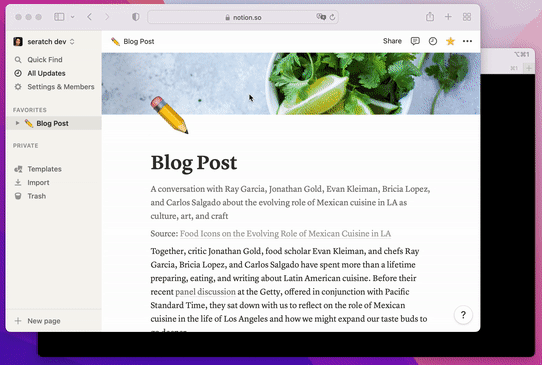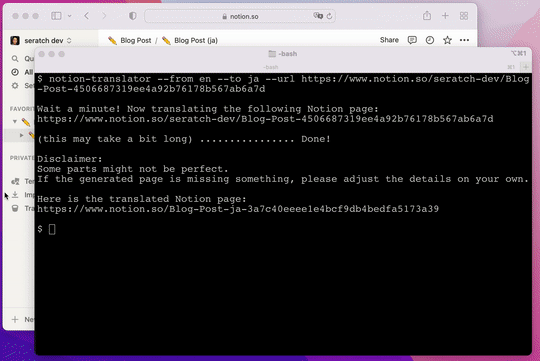https://github.com/seratch/notion-translator
CLI tool to translate Notion pages into a different language
https://github.com/seratch/notion-translator
cli deepl machine-translation nodejs notion
Last synced: 9 months ago
JSON representation
CLI tool to translate Notion pages into a different language
- Host: GitHub
- URL: https://github.com/seratch/notion-translator
- Owner: seratch
- License: mit
- Created: 2022-06-01T04:01:32.000Z (over 3 years ago)
- Default Branch: main
- Last Pushed: 2023-10-06T13:37:56.000Z (about 2 years ago)
- Last Synced: 2024-04-25T19:02:10.634Z (over 1 year ago)
- Topics: cli, deepl, machine-translation, nodejs, notion
- Language: JavaScript
- Homepage:
- Size: 34.2 KB
- Stars: 64
- Watchers: 4
- Forks: 19
- Open Issues: 4
-
Metadata Files:
- Readme: README.md
- License: LICENSE
Awesome Lists containing this project
README
# Notion Translator
[](https://badge.fury.io/js/notion-translator)
Notion Translator is a CLI tool that enables [Notion](https://www.notion.so/) users to translate Notion pages into a different language by leveraging [the DeepL's text translation API](https://www.deepl.com/api).
You can install this tool just by running:
```bash
npm install -g notion-translator
```
## How It Works
Let's say you'd like to translate a Notion page template written in English into a differen language such as Japanese, Spainish, and French. All you need to do with **notion-translator** are:
* Create a Notion internal integration and save its token as `NOTION_API_TOKEN` env variable
* Create a DeepL API account and save its token as `DEEPL_API_TOKEN` env variable
* Share the target Notion page with your Notion integration
* Run the following command to generate a translated page automatically
```bash
notion-translator \
--from en \
--to ja \
--url https://www.notion.so/acme/Blog-Post-ABC123
```
## Live Demo
Once you create your integration for translation and set the Notion / DeepL credentials in env variables, you can run the command to translate with the Notion page URL:

When the translated page is ready, the CLI opens the page in the default web browser for you. The CLI generates the page as a child page of the original one, but you can move it anywhere else if you would like to do so!

## Prerequisites
To run this CLI tool, the following are required:
* [Node.js](https://nodejs.org/) runtime for running the CLI (the latest LTS version is recommended)
* [Notion Internal Integration](https://www.notion.so/my-integrations) for reading and creating Notion pages
* [DeepL API Free/Pro Account](https://www.deepl.com/pro-api) for translating text in your Notion page blocks
### Notion Internal Integration
You can configure your integration by the following steps:
* Head to https://www.notion.so/my-integrations
* Click "New integration" button
* Give an easy-to-understand name (e.g., Notion Translator) to the integration
* Make sure that you select **Read content** and **Insert content** in the **Content Capabilities** section
* Make sure that you select **Read user information without email addresses** in the **User Capabilities** section (if you are confident that all the pages that you want to translate do not have any user mentions, **No user information** works too)
* Click the **Save** button

Once the integration is created, you can find your **Internal Integration Token** under **Secrets** section. The string value should start with `secret_`. You will use this value as `NOTION_API_TOKEN` when configuring the CLI later.
### DeepL API Account
You can configure your DeepL API account by the following steps:
* Head to https://www.deepl.com/pro-api
* Create either Free or Pro API account
Once your account is activated, you can find your DeepL API token on [your account page](https://www.deepl.com/account/summary). YOu will use this value as `DEEPL_API_TOKEN` when configuring the CLI later.
## Configure the CLI
You can install the CLI via `npm` command.
```bash
npm install -g notion-translator
```
Let's hit `notion-translator -h` to check if the command is now available for you.
```bash
$ notion-translator -h
Usage: notion-translator [options]
CLI to translate a Notion page to a different language
Options:
-u, --url
-f, --from
-t, --to
-d, --debug
-h, --help display help for command
```
Prior to running the command, set two env variables:
* `NOTION_API_TOKEN`: Notion's Internal Integration Token
* `DEEPL_API_TOKEN`: DeepL's API token
If you prefer using `.env` file, it also works as long as the file exists in the current directory.
## Run the CLI Command
Please don't forget to share the original Notion page with your integration. You can find **Share** link at the top of a Notion page. From there, you can invite your Notion Translator integration to the page.

Okay, everything should be ready! Let's run the command now :)
```bash
notion-translator \
--from en \
--to ja \
--url https://www.notion.so/acme/Blog-Post-ABC123
```
If your credentails are not properly set, the CLI opens Notion / DeepL configuration page in the default browser for you. Double-check the settings and token string values.
Also, if you are unsure about the language code to pass as from/to languages, please refer to [DeepL's official document](https://www.deepl.com/docs-api/translating-text/request/).
I hope that this tool will help you save time!
## Contributions
If you have any feedback or suggestions to this tool, please feel free to write in in this GitHub repository's issue tracker. Pull requests are welcome too!
## License
The MIT License